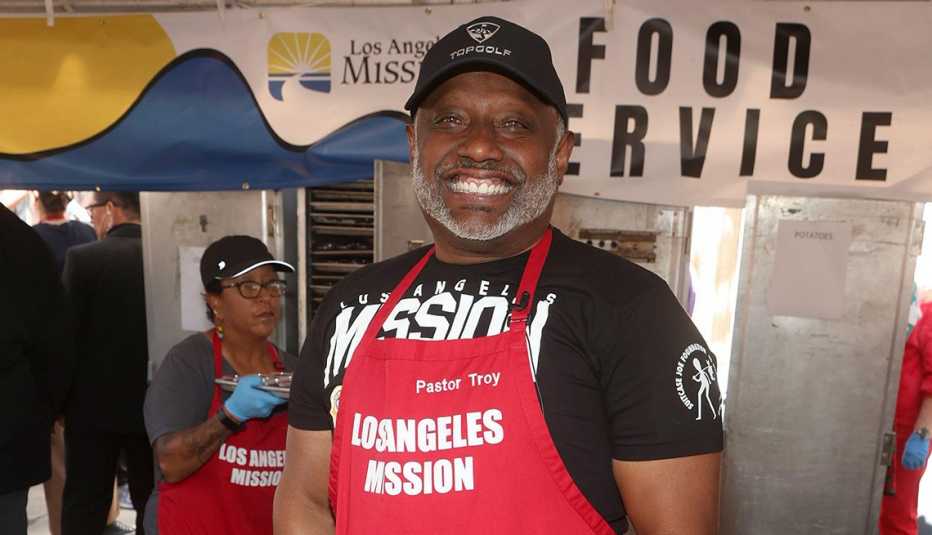AARP Hearing Center


The homelessness crisis in Los Angeles has gotten worse these last few years. You’ve probably seen images of tents lining Skid Row, the streets of Venice and downtown. You’ve likely read about the fentanyl and methamphetamine crises. Yet, from a seemingly endless news cycle of doom and gloom come stories of hope, redemption and recovery.
One such story is that of Pastor Troy Vaughn, who was homeless on Skid Row for seven years and is now the president and CEO of one of the largest homeless services providers in Los Angeles, the Los Angeles Mission.
Vaughn uses his personal experience to help those struggling to get out of homelessness. He doesn’t accept the narrative that homelessness is an intractable problem.
“I tell people they’re my past, and I’m their future,” Vaughn told AARP. “Because I want people to see the hope and possibility in my life — that if God did it for me, he can do it for them, but it takes work, it takes commitment.”
A native of Los Angeles, Vaughn served in the Marine Corps after high school, but he says he suffered a “traumatic break” when his father died of a drug overdose in the mid-1980s. “I started using controlled substances to kind of medicate myself,” he said, “and ended up on the streets of Los Angeles as a result of that — after I had wasted all my lively possessions.”


You can subscribe here to AARP Experience Counts, a free e-newsletter published twice a month. If you have feedback or a story idea then please contact us here.
Vaughn said being homeless is a constant struggle, and it exacerbates mental illness. A key part of homelessness, he said, is “this core sense of abandonment and isolation” and the feeling of being “in quicksand all the time.” He spent seven years in this state until he “hit rock bottom” and walked into a mission asking for help. The catalyst was when his mother told him she could no longer visit him on the streets.
“The thought of losing my mother saved me,” Vaughn said.
In 1992, Vaughn entered a year-long rehabilitation program at a mission in Los Angeles, where he learned how to live in sobriety, went back to school, and turned his life over to God. “I was taught by some of the best, and I emulated them in every way that I could, from my Christian character to my pursuit of quality education to the integrity I put into my work,” he said. “That truly saved my life.”
Vaughn, now 60, met his wife, Darlene, in one of his classes. They have been married for over 30 years and have a son, an adopted daughter, and five grandchildren. He eventually earned an MBA, an executive J.D., and a doctorate in theology. He says those first 10 years after being homeless were difficult, as he was working, going to school, and helping to support a family.
In 1999, Vaughn returned to Skid Row — this time to serve. He worked at various nonprofits, helping homeless individuals. He and Darlene also founded Christ-Centered Ministries, an organization that provides an array of services like job placement, stable housing and mental health services for people who are coming out of the prison system, have escaped sex trafficking or are suffering from mental illness, addiction and homelessness.





































































More From AARP
Chef Viet Pham Puts His Spin on Nashville Hot Chicken
‘Iron Chef’ champ and James Beard semifinalist wins big with a new classic
Meet the World’s Oldest Practicing Physician
At 100 years young, Dr. Howard Tucker offers advice on living a long life
Heroic Uber Driver Stops to Rescue People From Fire
Fritz Sam ran into a burning building — and still got his passenger to the airport on time
Recommended for You